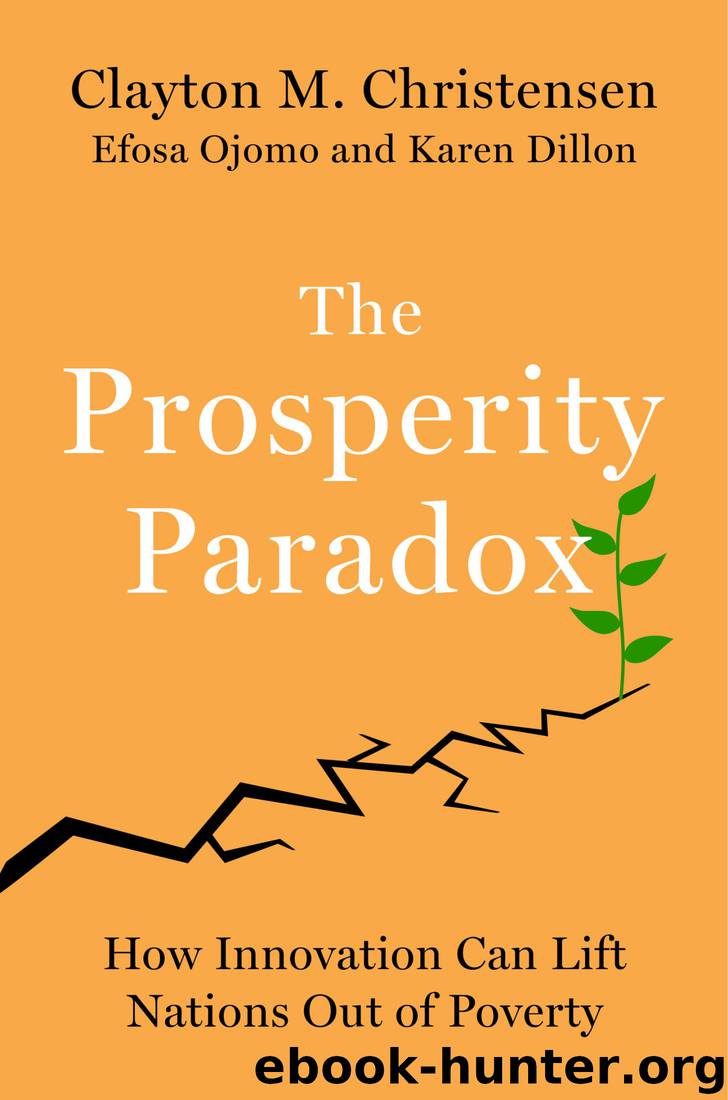The Prosperity Paradox by Clayton M. Christensen

Author:Clayton M. Christensen
Language: eng
Format: mobi, epub
Publisher: HarperCollins
Published: 2018-11-17T00:00:00+00:00
NOTES
1. “Vicente Fox,” PBS interview Commanding Heights, interview conducted April 4, 2001, http://www.pbs.org/wgbh/commandingheights/shared/minitext/int_vicentefox.html.
2. From the OECD website: “GDP per hour worked is a measure of labour productivity. It measures how efficiently labour input is combined with other factors of production and used in the production process. Labour input is defined as total hours worked of all persons engaged in production. Labour productivity only partially reflects the productivity of labour in terms of the personal capacities of workers or the intensity of their effort.”
“GDP per hour worked: OECD Data,” OECD, accessed April 10, 2018, https://data.oecd.org/lprdty/gdp-per-hour-worked.htm.
3. David Johnson, “These Are the Most Productive Countries in the World,” Time, January 4, 2017, http://time.com/4621185/worker-productivity-countries/.
4. In 2015, according to the Observatory of Economic Complexity, Mexico’s five largest exports were cars, $31.4 billion; vehicle parts, $26.2 billion; delivery trucks, $23.4 billion; computers, $21.2 billion; and telephones, $15.7 billion. More than 80 percent of Mexico’s exports end up in the United States. See Mexico’s profile on the Atlas for Economic Complexity site here: https://atlas.media.mit.edu/en/profile/country/mex/.
5. Mexico has maintained an average inflation rate of 3.9 percent since 2006. Real interest rates in 2015 hovered around 0.9 percent; Iceland, the United States, and Switzerland had real interest rates of 1.6 percent, 2.2 percent, and 3.3 percent respectively.
6. FDI in Mexico in 1993 was approximately $4.3 billion; twenty years later, in 2013, it had increased more than eleven times, reaching approximately $47.5 billion. This increase in FDI is due in part to Mexico’s relatively stable macroeconomic environment.
7. The fact that Mexico doesn’t simply export toys and T-shirts is important. Research by Harvard University’s Ricardo Hausmann and MIT’s César A. Hidalgo has helped us understand that the complexity of a country’s economy (how sophisticated the products it makes are) is highly correlated with its development level. More capable countries that can produce more sophisticated products tend to be richer.
César A. Hidalgo and Ricardo Hausmann, “The building blocks of economic complexity,” Proceedings of the National Academy of Sciences 106, no. 26 (June 2009).
8. “Economy Rankings,” Doing Business, The World Bank, accessed April 2, 2018, http://www.doingbusiness.org/rankings.
9. For a more in-depth economic history of Mexico pre-1960, read Section 2 of “Catch-up Growth Followed by Stagnation: Mexico, 1950–2010,” written by Timothy J. Kehoe and Felipe Meza, https://www.minneapolis fed.org/research/wp/wp693.pdf.
10. From a business standpoint, even though Mexico has more than twice the population of Korea and enjoys the benefits we mentioned above, the country has just nine companies on a Forbes list of the one thousand biggest public companies, compared with South Korea’s thirty-one. Also, South Korea’s credit rating is currently AA2, the third highest, according to Moody’s Investors, and AA- according to Fitch. Mexico’s is A3 with a negative outlook according to Moody’s, and it is BBB+ according to Fitch. By most measures, South Korea is outperforming Mexico economically.
11. Anahi Rama and Anna Yukhananov, “Mexican government says poverty rate rose to 46.2 percent in 2014,” Reuters, July 23, 2015, http://www.reuters.com/article/us-mexico-poverty-idUSKCN0PX2B320150723.
12. Gordon Hanson, of the University of California in San Diego and the National Bureau of Economic Research, has written extensively about Mexico and the role of maquiladoras in their economy.
Download
The Prosperity Paradox by Clayton M. Christensen.epub
This site does not store any files on its server. We only index and link to content provided by other sites. Please contact the content providers to delete copyright contents if any and email us, we'll remove relevant links or contents immediately.
International Integration of the Brazilian Economy by Elias C. Grivoyannis(57383)
The Radium Girls by Kate Moore(10915)
Turbulence by E. J. Noyes(7055)
Nudge - Improving Decisions about Health, Wealth, and Happiness by Thaler Sunstein(6642)
The Black Swan by Nassim Nicholas Taleb(6203)
Pioneering Portfolio Management by David F. Swensen(5615)
Rich Dad Poor Dad by Robert T. Kiyosaki(5162)
Zero to One by Peter Thiel(4834)
Man-made Catastrophes and Risk Information Concealment by Dmitry Chernov & Didier Sornette(4747)
Secrecy World by Jake Bernstein(3788)
Millionaire: The Philanderer, Gambler, and Duelist Who Invented Modern Finance by Janet Gleeson(3575)
Skin in the Game by Nassim Nicholas Taleb(3477)
The Age of Surveillance Capitalism by Shoshana Zuboff(3430)
The Money Culture by Michael Lewis(3291)
Skin in the Game: Hidden Asymmetries in Daily Life by Nassim Nicholas Taleb(3271)
Bullshit Jobs by David Graeber(3189)
The Dhandho Investor by Mohnish Pabrai(3175)
The Wisdom of Finance by Mihir Desai(3086)
Blockchain Basics by Daniel Drescher(2895)
